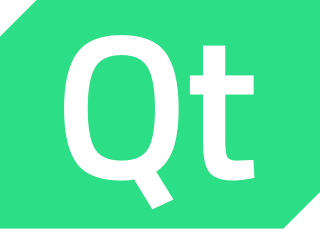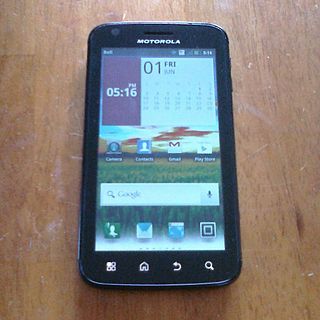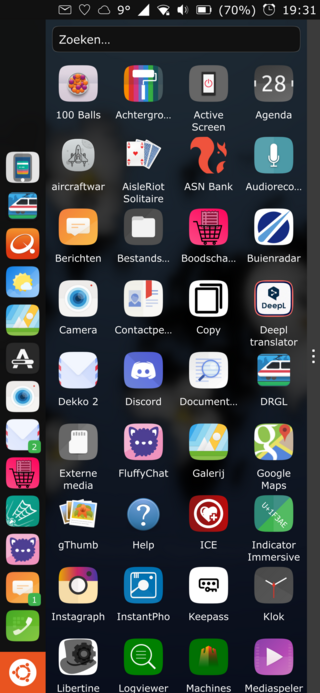
Qt is cross-platform software for creating graphical user interfaces as well as cross-platform applications that run on various software and hardware platforms such as Linux, Windows, macOS, Android or embedded systems with little or no change in the underlying codebase while still being a native application with native capabilities and speed.
Technical variations of Linux distributions include support for different hardware devices and systems or software package configurations. Organizational differences may be motivated by historical reasons. Other criteria include security, including how quickly security upgrades are available; ease of package management; and number of packages available.

Scrivener is a word-processing program and outliner designed for writers. Scrivener provides a management system for documents, notes and metadata. This allows the user to organize notes, concepts, research, and whole documents for easy access and reference. Scrivener offers templates for screenplays, fiction, and non-fiction manuscripts. After writing a text, the user may export it for final formatting to a standard word processor, screenwriting software, desktop publishing software, or TeX.
A mobile operating system is an operating system used for smartphones, tablets, smartwatches, smartglasses, or other non-laptop personal mobile computing devices. While computers such as typical/mobile laptops are "mobile", the operating systems used on them are generally not considered mobile ones, as they were originally designed for desktop computers that historically did not have or need specific mobile features. This line distinguishing mobile and other forms has become blurred in recent years, due to the fact that newer devices have become smaller and more mobile unlike hardware of the past. Key notabilities blurring this line are the introduction of tablet computers and light-weight laptops and the hybridization of the two in 2-in-1 PCs.

Google Chrome is a web browser developed by Google. It was first released in 2008 for Microsoft Windows, built with free software components from Apple WebKit and Mozilla Firefox. Versions were later released for Linux, macOS, iOS, and also for Android, where it is the default browser. The browser is also the main component of ChromeOS, where it serves as the platform for web applications.

webOS, also known as LG webOS and previously known as Open webOS,HP webOS and Palm webOS, is a Linux kernel-based multitasking operating system for smart devices such as smart TVs that has also been used as a mobile operating system. Initially developed by Palm, Inc., HP made the platform open source, at which point it became Open webOS.
A mobile development framework is a software framework that is designed to support mobile app development. It is a software library that provides a fundamental structure to support the development of applications for a specific environment.

CyanogenMod is a discontinued open-source operating system for mobile devices, based on the Android mobile platform. Developed between 2009 and 2016, it was free and open-source software based on the official releases of Android by Google, with added original and third-party code, and based on a rolling release development model. Although only a subset of total CyanogenMod users elected to report their use of the firmware, on 23 March 2015, some reports indicated that over 50 million people ran CyanogenMod on their phones. It was also frequently used as a starting point by developers of other ROMs.

The Motorola Atrix 4G is an Android-based smartphone developed by Motorola, introduced at CES 2011 along with the Motorola Xoom, Motorola Droid Bionic, and Motorola Cliq 2 on January 5, 2011. It was made available in the first quarter of 2011.

The HP TouchPad is a tablet computer that was developed and designed by Hewlett-Packard. The HP TouchPad was launched on July 1, 2011, in the United States; July 15 in Canada, United Kingdom, France, Germany; and August 15 in Australia.

Chromebook is a line of laptop and tablet computers that run ChromeOS, an operating system developed by Google.

Firefox OS is a discontinued open-source operating system – made for smartphones, tablet computers, smart TVs, and dongles designed by Mozilla and external contributors. It is based on the rendering engine of the Firefox web browser, Gecko, and on the Linux kernel. It was first commercially released in 2014.

Replicant is a free operating system (OS) based on the Android mobile platform that intends to replace all proprietary Android components with free-software counterparts. It is available for several smartphones and tablet computers. It is written in the same programming languages as Android. The modifications are mostly in the C language; the changes are mostly to the lower-level parts of the OS, such as the Linux kernel and drivers that use it.
Firefox was created by Dave Hyatt and Blake Ross as an experimental branch of the Mozilla browser, first released as Firefox 1.0 on November 9, 2004. Starting with version 5.0, a rapid release cycle was put into effect, resulting in a new major version release every six weeks. This was gradually accelerated further in late 2019, so that new major releases occur on four-week cycles starting in 2020.

Ubuntu Touch is a mobile version of the Ubuntu operating system, being developed by the UBports community. Its user interface is written in Qt, and is designed primarily for touchscreen mobile devices such as smartphones and tablet computers, but the original goal of convergence was intended to bring Ubuntu Touch to laptops, desktops, IOT devices and TVs for a complete unified user experience.

elementary OS is a Linux distribution based on Ubuntu LTS. It promotes itself as a "thoughtful, capable, and ethical" replacement to macOS and Windows and has a pay-what-you-want model. The operating system, the desktop environment, and accompanying applications are developed and maintained by elementary, Inc.

OpenZFS is an open-source implementation of the ZFS file system and volume manager initially developed by Sun Microsystems for the Solaris operating system and now maintained by the OpenZFS Project. It supports features like data compression, data deduplication, copy-on-write clones, snapshots, and RAID-Z. It also supports the creation of virtual devices, which allows for the creation of file systems that span multiple disks.

LineageOS is an Android-based operating system for smartphones, tablet computers, and set-top boxes, with mostly free and open-source software. It is the successor to CyanogenMod, from which it was forked in December 2016, when Cyanogen Inc. announced it was discontinuing development and shut down the infrastructure behind the project. Since Cyanogen Inc. retained the rights to the Cyanogen name, the project rebranded its fork as LineageOS.













